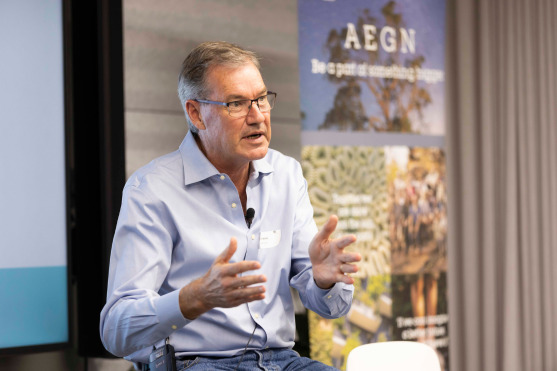Climate Lens tool launches to provide new perspective on philanthropy and climate change

Pictured: Darrel Wade, Chairman, Intrepid and Director, Dawn Wade Foundation spoke at the Melbourne launch of AEGN’s climate lens on Wednesday.
Philanthropy Australia and the Australian Environmental Grantmakers Network partner to launch Australia’s first comprehensive Climate Lens tool. The tool highlights how philanthropists can help minimise the effects of climate change by taking a nuanced approach to supporting social impact.
The Australian Environmental Grantmakers Network (AEGN) and Philanthropy Australia have launched The Climate Lens, a powerful and flexible tool designed to help funders, philanthropists, and Australians interested in climate action by breaking down the unique impacts of climate change on various social issues.
With only around 2 per cent of philanthropic giving in Australia directed to the environment and climate change, The Climate Lens aims to highlight this dire gap in the giving and impact sector, and the domino effect on other issue areas and marginalised communities when climate action is not adequately funded or understood.
The tool highlights the distinct cross-sections between climate change impacts and common funding areas like health and wellbeing, children and young people, women’s rights and gender equality, socioeconomic disadvantage, disasters and emergency management, biodiversity threats, and Aboriginal and Torres Strait Islander justice.
Some key research demonstrating these intersections highlighted in the tool include:
- Aboriginal and Torres Strait Islander justice: In NSW, VIC, ACT and Jervis Bay Territory, First Nations Australians were twice as likely to be directly impacted by the 2019–20 Black Summer bushfires than their non-Indigenous neighbours
- Young Australians: 86% of Australians aged 14 to 17 already consider climate change a threat to their safety.
- Women: The UN estimates that women comprise 80% of people displaced by climate change
- Disadvantaged people: Australians facing disadvantage are more likely to live in areas most affected by climate impacts; when disasters hit, these communities have less resources to cope
- Other findings:
- Globally, for every dollar invested in climate-resilient infrastructure, six dollars are saved in future disaster costs
- Australia leads the world in mammal extinctions and 19 of our most important ecosystems are collapsing
- Heatwave intensity in Australia has increased by 103% since 2001, killing more than 2300 people each year
The tool showcases several Australian funders working across a range of areas, and at different stages of their giving journeys, who have each taken a unique approach to applying a climate lens to their giving, achieving better outcomes for people and nature as a result. This includes Dr Catherine Brown OAM, CEO, Lord Mayor’s Charitable Fund, Hayley Morris, Executive Director of the Morris Group, Stacey Thomas, CEO, The Wyatt Trust, Tash Keuneman, Director of The Keuneman Foundation, and Sarah Buckley, Chief Executive Officer at The Trawalla Foundation.
Amanda Martin OAM, CEO of Australian Environmental Grantmakers Network, said, “While some funders are passionate about the climate crisis, others are newer to exploring these issues, or may feel unsure where to start. The Climate Lens aims to help Australians understand that funding climate action inherently helps to address the other issues they care about; whether it’s First Nations justice, gender equality, poverty and disadvantage, health or other areas. There is no community that climate change is not impacting in Australia, and our marginalised communities are most at risk. The more we can understand the implications of these intersecting issues, the better we can drive action and effective outcomes.”
Jack Heath, CEO of Philanthropy Australia, said, “We know climate change is on many of our members’ minds, but the size and complexity of the issue can often obscure pathways to action. The Climate Lens tool shines a light on the impacts and opportunities to act in a clear and compelling way. We think it will be an invaluable resource to the philanthropic community in Australia.”
In a forward for The Climate Lens, Bec Milgrom, Executive Director of Tripple and member of the AEGN said, “A climate lens is important because it is going to take all hands on deck and all tools in the toolbox to tackle the climate crisis. Philanthropy has a critical role to play in shaping our national ambition, shaping the narrative; and ensuring the voices that are centered in this work are diverse and representative of those of the frontlines. Climate justice and systems change are our focus, but other issues may feel closer to you. Regardless of the specific cause or pool of funds available, philanthropy has the power to change perspectives, systems and norms and the time to act is now.”
For more information about The Climate Lens or to download the tool, visit aegn.org.au/climate-lens
To get involved in funding or supporting climate action today, reach out to the AEGN or Philanthropy Australia.